A federal judge has handed down his punishment against Google after ruling that the tech company’s online search business is a monopoly.
US District Judge Amit Mehta, in a 230-page ruling on Tuesday, barred Google from having exclusive contracts for its Google Search, Chrome, Google Assistant, and Gemini app products as part of his remedy to the more than $2 trillion company’s monopoly in search.
But the ruling fell short of some of the most contentious demands from the US government. Mehta said Google would not have to divest from Chrome or Android.
“Plaintiffs overreached in seeking forced divestiture of these key assets, which Google did not use to effect any illegal restraints,” Mehta wrote in the Tuesday ruling.
Alphabet shares jumped more than 6% in after-hours trading.
Additionally, Mehta ruled that Google must share search data with competitors.
In the order, Mehta remarked that while Google remains the dominant player in online search, the legal landscape shifted during the case with the introduction of general artificial intelligence.
The judge said he crafted the remedies “with a healthy dose of humility.”
Related stories
“Unlike the typical case where the court’s job is to resolve a dispute based on historic facts, here the court is asked to gaze into a crystal ball and look to the future,” Mehta wrote. “Not exactly a judge’s forte.”
In a landmark ruling last year following a 10-week non-jury trial in 2023, Mehta found that Google violated US antitrust law by maintaining a monopoly with its online search business.
“Google is a monopolist, and it has acted as one to maintain its monopoly,” Mehta wrote in the ruling at the time.
The legal showdown pitting the tech behemoth against the Department of Justice and a coalition of states sparked the biggest monopoly ruling since Microsoft faced a potential breakup nearly 30 years ago. In that case, a federal judge in 2000 ordered Microsoft to be split up, but the ruling was later reversed on appeal.
As part of its proposed remedies for Google, the Justice Department had asked the Washington, DC judge to force Google to sell off its Chrome web browser, end its exclusive multibillion-dollar deals with Apple, Mozilla, Samsung, and others to make Google the default search engine on web browsers and smartphones, and share search data with rivals. Chrome is the world’s most popular web browser.
The Justice Department wanted the court to force Google to break off its Android mobile operating system if the search market doesn’t experience an increase in competition through its sweeping proposed fixes.
The remedies hearing, which began in April and lasted for three weeks, saw testimony from Sundar Pichai, the CEO of Google’s parent company Alphabet, who argued that the DOJ’s proposed fixes amounted to a “de facto divestiture” of Google’s search business.
Pichai warned in his testimony that the government’s proposals would have “many unintended consequences.”
Artificial intelligence firms OpenAI and Perplexity have previously floated their desires to buy Chrome should Google be forced to divest Chrome.
“If Chrome is really going to sell, we should take a look at it,” OpenAI CEO Sam Altman recently told a group of reporters.
Earlier last month, Perplexity offered up $34.5 billion to buy Chrome. Search.com and Yahoo also expressed interest.
In an opening statement during the remedies hearing, a Justice Department lawyer said the court must prevent Google from using its search monopoly to dominate the AI market.
“Unless Google’s vast payments are eliminated, Google will likely win each search distribution opportunity, given the tremendous advantages it has accrued from over 10 years of monopoly maintenance,” DOJ lawyers wrote in a post-trial May court filing.
Google has vowed to appeal Mehta’s original ruling deeming the tech giant a monopolist — and it could be years before there’s a final outcome.
In a series of posts on X after the remedies hearing ended in May, Google said the DOJ’s proposals went “miles beyond” the judge’s decision and “would harm consumers, businesses and America’s tech leadership.”
“We still strongly believe the Court’s original decision was wrong, and look forward to our eventual appeal,” Google said in a post.
Meanwhile, Google still has more antitrust headaches ahead.
A Virginia federal judge ruled in April that the company holds an illegal monopoly in certain online advertising technology markets. A remedies hearing in that case is set to begin in September.


